- News
- Reviews
- Bikes
- Accessories
- Accessories - misc
- Computer mounts
- Bags
- Bar ends
- Bike bags & cases
- Bottle cages
- Bottles
- Cameras
- Car racks
- Child seats
- Computers
- Glasses
- GPS units
- Helmets
- Lights - front
- Lights - rear
- Lights - sets
- Locks
- Mirrors
- Mudguards
- Racks
- Pumps & CO2 inflators
- Puncture kits
- Reflectives
- Smart watches
- Stands and racks
- Trailers
- Clothing
- Components
- Bar tape & grips
- Bottom brackets
- Brake & gear cables
- Brake & STI levers
- Brake pads & spares
- Brakes
- Cassettes & freewheels
- Chains
- Chainsets & chainrings
- Derailleurs - front
- Derailleurs - rear
- Forks
- Gear levers & shifters
- Groupsets
- Handlebars & extensions
- Headsets
- Hubs
- Inner tubes
- Pedals
- Quick releases & skewers
- Saddles
- Seatposts
- Stems
- Wheels
- Tyres
- Health, fitness and nutrition
- Tools and workshop
- Miscellaneous
- Tubeless valves
- Buyers Guides
- Features
- Forum
- Recommends
- Podcast
news
“Brutal sport”: Shocking scenes as ill pro cyclist collapses on side of the road during race after suffering in heat; “Rubbing’s racing, go all in”: Tom Pidcock wins Olympic mountain bike epic – and is booed by angry French crowd + more on the live blog
SUMMARY
 Mauricio Moreira collapses on the side of the road ill at 2024 Volta a Portugal (Leegore Carlos)
Mauricio Moreira collapses on the side of the road ill at 2024 Volta a Portugal (Leegore Carlos)29 July 2024, 08:09
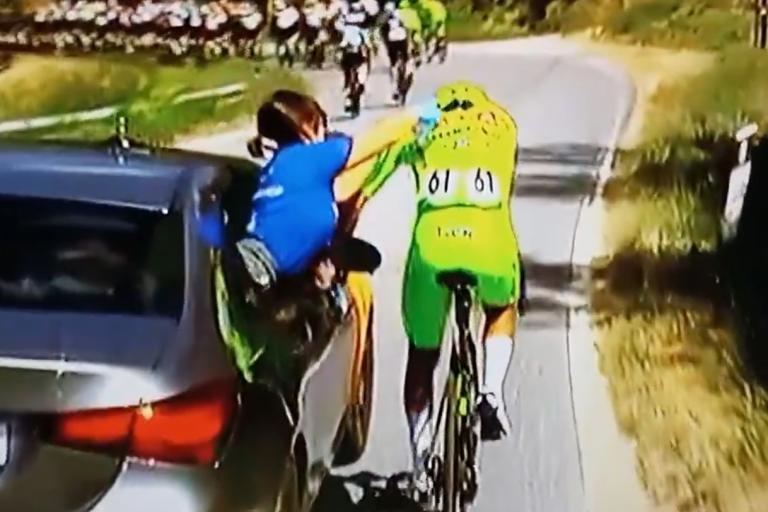
“Brutal sport”: Shocking scenes as former winner collapses on side of the road during extremely hot Volta a Portugal stage – but team says Mauricio Moreira is “doing well” in hospital after quitting race
While the time trial course at the Olympics seemed to have been tailor-made for Adam Peaty, thanks to the heavy rainfall that turned Paris’ streets into a sodden crash-fest, over in Portugal things are on the somewhat hotter side.
The 11-day Volta a Portugal, one of cycling’s longest stage races and the sport’s spiritual home of insane, improbable climbing performances (someone should talk Tadej Pogačar into targeting it next year), got underway last week, with 22-year-old home rider Afonso Eulálio holding the leader’s jersey after an impressive display on Saturday’s long climb to the summit finish at Torre.
But on yesterday’s lumpy 165km stage to Guarda, won by Euskaltel’s 40-year-old former Cofidis and rat tail-sporting veteran Luis Ángel Maté, things weren’t looking quite so rosy for former Volta winner Mauricio Moreira.
Maurício Moreira abandona a Volta a Portugal. pic.twitter.com/Z21VXf2zCp
— Leegore Carlos (@LeegoreCarlos) July 28, 2024
The 29-year-old Uruguayan, who won the Portuguese stage race in 2022 and had started this year’s edition in good form with two top ten placings, began to suffer early in the intense heat on the Famalicão da Serra climb, with around 50km of leg-breaking climbing remaining to the finish.
A clearly sick Moreira, initially determined to plough on, was soon surrounded by his Sabgal-Anicolor teammates, with Luís Mendonça later warned by the commissaires for pushing his leader on the climb.
However, with the race disappearing up the road, the 29-year-old soon succumbed to the inevitable.
As shocking footage shared on social media shows, a suffering, labouring Moreira was receiving support from the race’s medical car – which in this instance involved pouring water down his back to cool him off – when he pulled across to the side of the road and collapsed, one foot still clipped to the pedal.
But at least he was lucid enough to pick a shady spot to lie down, I suppose…
“Brutal sport, brutal video,” Mihai Simon, who shared the clip, wrote on X/Twitter.
“It reminded me of the dramatic collapse of Giuseppe Zorzi in the 1962 Tour de France,” he continued. “These cyclists were always insane, pushing their bodies beyond the limit.”
> Why pro cycling needs to ditch its ‘hardness’ obsession
Setting aside the inevitable debate over whether it’s right that pro cyclists should be allowed, by their teams, the race organisers, or whoever, to “push their bodies beyond the limit”, thankfully Moreira’s Sabgal team confirmed last night that their leader is doing okay after being taken to hospital.
“Mauri was flown to the Guarda Hospital for tests, but he is doing well and with us,” the team said. “A difficult moment for our squad, but we will try to reverse it.”
Brutal sport, indeed.
29 July 2024, 13:37
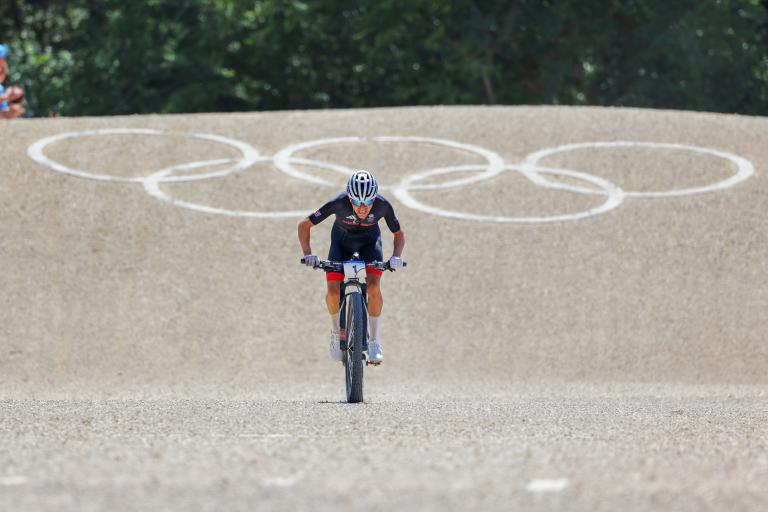
What a race! Tom Pidcock recovers from puncture to win second consecutive Olympic mountain bike gold in thriller – and annoy the partisan home crowd, who boo British star across the line after late winning move
Now that was something else.
In arguably the most thrilling, nail-biting, and intense hour-and-a-half of the entire cycling season, Tom Pidcock recovered from a mid-race puncture to claw back a 40-second deficit on home favourite Victor Koretzky, before bursting past the Frenchman through an impossible gap in the dying seconds to win his second consecutive Olympic mountain bike cross-country gold.
(Ed Sykes/SWpix.com)
After a relatively steady start, the multi-disciplinary British star had begun to stamp his authority on the race by the third lap when, in the company of Koretzky, he suffered an untimely puncture, albeit within metres of the pits.
However, by the time the admittedly dithering British mechanics had swapped out his front wheel, Pidcock was 36 seconds behind, a deficit that grew over the next lap as the 24-year-old regained his composure.
But, instead of one all-out concerted effort to claw his way back to the front, the defending champion remained calm, slowly working his way through the field as Koretzky kept his own composure while being roared on by a raucous home crowd, eager to see a French gold double following Pauline Ferrand-Prévot’s win in Élancourt Hill yesterday.
(Alex Whitehead/SWpix.com)
As 30 seconds ticked down to 15, and then to 10, Pidcock finally bridged across to Koretzky on the penultimate lap, followed by Alan Hatherly, aiming to become Africa’s first Olympic mountain bike medallist.
Never one to bide his time in the wheels, Pidcock immediately drove it on the front, launching a series of accelerations in a bid to dislodge his unmoving French rival.
After these probing moves failed, and with Pidcock aiming to capitalise on his uphill strength, all eyes turned to the final steep climbing section before the swift drop to the line. But as the world waited for the inevitable Pidcock acceleration, it was the cunning Koretzky, in a sensational display of strength and tactics, who instead launched on the sharp rise, opening a small gap to the Ineos man.
Desperately clinging on as they plummeted towards the line, Pidcock clawed his way back again following a small hiccup by the Frenchman, setting up a scintillating sprint for gold.
(Alex Whitehead/SWpix.com)
And then, with the finish line almost in sight as they made their way through the trees on Élancourt Hill’s rare natural section, Pidcock dive bombed Koretzky around a tree, nudging his wheel in front as the pair made contact.
That brief contact was enough to unclip and unsettle the Frenchman, who was forced to watch in agony as Pidcock celebrated across the line mere metres ahead to a chorus of jeers from a home crowd equally devastated by the shocking twist which came at the end of one of cycling’s great thrillers.
A hostile, booing crowd may not have been the soundtrack Pidcock expected to hear as he won his second Olympic gold at the age of 24 – but I doubt he’ll care much.
29 July 2024, 14:17
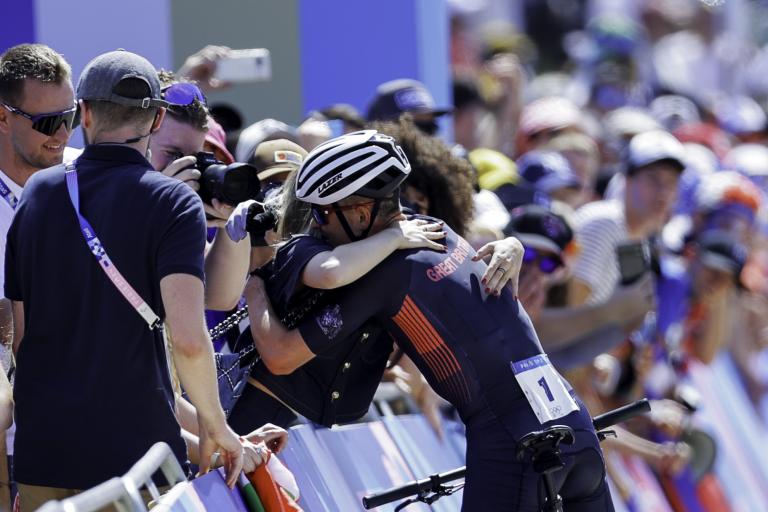
“Rubbing’s racing – it’s the Olympics, you have to go all in”
To any French fans annoyed by Tom Pidcock’s late dive bomb to win Olympic mountain bike gold against home favourite Victor Koretzky this afternoon, the British star has some NASCAR-inspired words for you: “Rubbing’s racing”.
“In the build-up to the Olympics, so many scenarios and emotions run through your head. By the time you get to the start line, you’re knackered as it is,” the now double Olympic champion said after his thrilling victory in Elancourt Hill.
“I knew Victor would be strong and it wouldn’t be easy today, and then the puncture happened. Bruno wasn’t ready in the pits, but he did a fast change. And I knew at that point I had five laps, almost 50 minutes, so I knew anything was possible.”
The Pidcock overtake 🤯
🎥 @BBCSport #Paris2024pic.twitter.com/v7L5T0c2Jz
— Team GB (@TeamGB) July 29, 2024
Reflecting on that last-gasp move, which promoted a cacophony of boos from the French crowd as he crossed the line victorious, the 24-year-old said: “But when I got back to Victor, I couldn’t get rid of him, and I knew how fast he was on the last lap. And in the end, I just had to go for a gap.
“And rubbing’s racing! It’s what I’ve always done, and the Olympics is no different.
“I feel sorry for him, because the support was incredible, but it’s the Olympics, you have to go all in.”
And boy, does Tom Pidcock not half go all in…
29 July 2024, 16:20
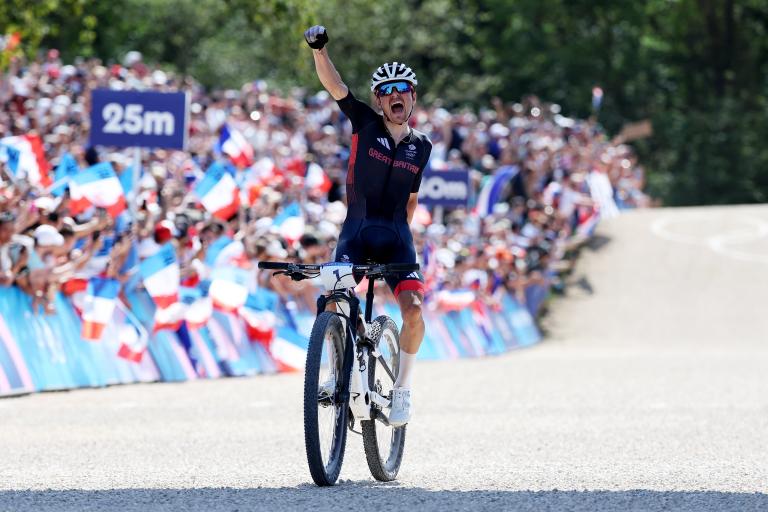
Was Tom Pidcock’s epic Olympic comeback the greatest cycling performance of 2024?
Alright, I still haven’t got over that thriller on Élancourt Hill yet (I know, I may actually be a mountain bike convert now, the horror), capped off by Tom Pidcock winning in the most Tom Pidcock way ever, so decided to put the following question to you lovely live blog readers:
Did we just see the most exciting, intense, brilliant bit of bike racing all year?
Let us know what you think, and we can discuss why mountain biking is the great sport in the world tomorrow morning (Disclaimer: I may completely disavow everything I just said and return to being a road purist within 24 hours).
29 July 2024, 15:51
Ah, so that’s what David Gaudu was getting ready for this summer after all
La reconversion réussie de David Gaudu. pic.twitter.com/rM7fINos3X
— Dans la Musette (@DansLaMusette) July 29, 2024
That explains his performance at the Tour anyway…
29 July 2024, 15:30
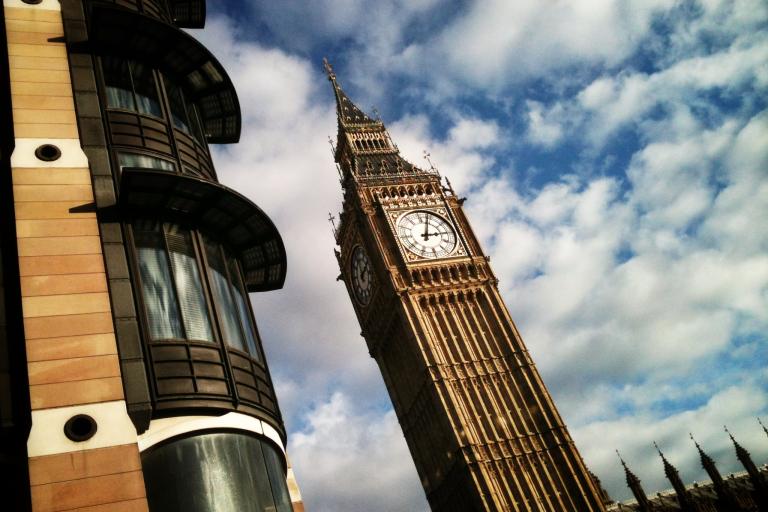
Former active travel minister Jesse Norman named as new co-chair of All Party Parliamentary Group for Cycling and Walking
The All Party Parliamentary Group for Cycling and Walking was inaugurated for the new Parliament last week, with Jesse Norman – who had two stints in the Department for Transport during the Conservatives’ 14-year spell in government – named as one of the group’s co-chairs, alongside Labour MP Fabian Hamilton, who continues in the role.
Norman, who was responsible for walking and cycling during his tenure in the DfT, will take up the role on an interim basis, replacing Selaine Saxby after lost her seat at the General Election.
Andy McNae, the Labour MP for Rossendale and Darwen, will become Treasurer, while Lib Dem Olly Glover, MP for Didcot and Wantage, becomes the group’s Vice-Chair.
The group’s plans for the months ahead include meetings on the subject of e-bike batteries, the Planning and Infrastructure Bill, and a major new report with British Cycling and Leigh Day.
‘’I am delighted to continue in my role as co-chair of the All Party Parliamentary Group for Cycling and Walking. We will continue to work both inside and outside of Parliament to promote all forms of cycling and walking,” Hamilton said in a statement today.
‘’A new government provides new opportunities to ensure that as many people as possible are enabled to experience the many benefits of active travel. We look forward to an ambitious programme of work this year, and engaging with many of the new Members of Parliament elected in July.’’
29 July 2024, 14:46
How the race was lost, part one
While most of the post-race attention focuses on THAT winning move around the tree, it was actually an earlier slip-up by Victor Koretzky – missed by the TV cameras, and seconds before Pidcock’s race-winning attack – that allowed the Ineos rider to make the junction just as the Frenchman looked like he was about to sail downhill to gold:
J’ai la vidéo pour toi mon Paulo pic.twitter.com/6LgQhsrkvL
— LaGlissade (@YntoTheRide) July 29, 2024
And the rest, as they say, is double Olympic gold-winning history…
29 July 2024, 12:49
Drama as Tom Pidcock suffers puncture – and excruciatingly slow change – while leading Olympic mountain bike race
In case you missed this while the BBC was flipping channels…
It was all going so smoothly for Tom Pidcock, whose attack on the third lap of today’s Olympic cross-country mountain bike race had left only Victor Koretzky in his wheel – until, that is, the defending champion suffered a front puncture just as he was turning the screw on the French favourite.
On the plus side for Pidcock, he managed to flat just before the pits.
On the negative side, however, was the extremely slow change by the seemingly unsuspecting Team GB mechanics, forced to run back into the tents to find a new wheel as the British star, who remained remarkably calm, lost a number of places and 36 seconds to a flying Koretzky.
But with over half the race remaining, there’s still plenty of time for another come-from-behind Pidcock masterclass…
29 July 2024, 12:27
Nothing to see here, just Tom Pidcock taking on an Olympic mountain bike jump with a bottle in his mouth…
Well, fuelling is key, they say.
Steady, patient start by Pidcock here during the opening laps of the cross-country MTB race (bottle-wielding jumps and all), as he makes his way steadily through the pack into the top three, with fellow Brit Charlie Aldridge also battling in the top ten.
29 July 2024, 12:15
“Less confident cyclists and children won't be able to use it and it will encourage drivers to close pass”
Cyclists have slammed Torbay council for scrapping plans for a long-awaited bike lane in Torquay after last-minute changes to move a line of trees closer to the roadside kerb, despite every illustration and plan regarding the scheme clearly showing a segregated cycling path until now.
Speaking to road.cc, one local cyclist accused the council of being “very sneaky” and hiding the news in a press release. However, a Conservative councillor has claimed that “cyclists will be pleased with what they see when the scheme is finished”.
Read more: > “Is this what anyone wants?” Council goes back on promise and scraps cycle lane plans without any consultation to move “line of trees closer to kerb”
29 July 2024, 11:49
“Jack’s legacy will always be remembered”: Tributes paid to legendary Northern Irish cycling stalwart Jack Watson, who died this morning following a short illness
It is with great sadness that Cycling Ireland has learned of the passing of Jack Watson MBE who died this morning after a short illness.
May he rest in peace.https://t.co/Z1gzd9h4oi pic.twitter.com/s3suNL0ckJ
— Cycling Ireland (@CyclingIreland) July 29, 2024
Tributes have been paid from across the cycling world to Jack Watson, the Cycling Ireland founder and lifelong Irish cycling stalwart, who passed away this morning following a short illness.
A founding member of North Down Cycling Club, Jack raced in England for a spell before following in his father’s footsteps by dedicating himself to cycling administration, playing a leading role in the sport’s development in Ireland since 1970.
Chairperson of the Northern Ireland Cycling Federation, he was involved in the formation of the Tripartite Committee, the organisation tasked in the late 1970s and 1980s, a turbulent, bloody time in Irish politics, with healing the organisational divisions which had plagued cycling across the island for decades.
Jack was a founding board member of what became Cycling Ireland upon its establishment in 1988, becoming the unified governing body’s president in 1990 and its secretary in 1995.
He was also an international commissaire (his son Paul is set to fulfil this role at the upcoming Paralympics) and doping control officer (implementing an anti-doping policy for all sports in Northern Ireland in the 1980s), while also working as a team manager and mechanic for Ireland and Northern Ireland at several international races in the 1970s and 1980s, including numerous world championships and Commonwealth Games, and the 1984 Olympic Games.
In 2003, he was presented with the UCI’s Gold Merit award by the sport’s governing body and ten years later was one of the first inductees to Cycling Ireland’s Hall of Fame.
We are deeply sorry to hear about the passing of Jack Watson. He was a key figure in Irish and European cycling, and his contributions to the sport were immense.
Jack's legacy will always be remembered.
Our thoughts and prayers are with our friend Paul, Jack's family and friends pic.twitter.com/zI5WBzOOXI— UEC_cycling (@UEC_cycling) July 29, 2024
“It is with great sadness that Cycling Ireland has learned of the passing of Jack Watson MBE who died this morning after a short illness,” the governing body announced this morning.
“Cycling Ireland would like to extend our deepest sympathy to his wife Rea, sons Paul and Alan and all his extended family.
“Everyone involved in cycling is aware of the immense contribution Jack made to cycling on the island and he will be deeply missed.”
In a statement on social media, the European Cycling Union, for whom Jack acted as a delegate at the UCI, added: “We are deeply sorry to hear about the passing of Jack Watson. He was a key figure in Irish and European cycling, and his contributions to the sport were immense.
“Jack’s legacy will always be remembered. Our thoughts and prayers are with our friend Paul, Jack’s family, and friends.”
29 July 2024, 11:19
Cyclists praise council decision to install bollards on main road as work begins on collapsed historic bridge
Away from the Olympics for a second and over to Worcester, where cyclists have praised the local county council’s decision to install bollards on the A449 to ensure people on bikes can get around safely, as work begins to repair a historic bridge used by pedestrians and cyclists.
In February, part of the supporting wingwall of Powick Old Bridge – built in the 15th century and the sight of the opening skirmish of the First English Civil War in 1642, and now a commonly used route for walkers and cyclists – collapsed into the River Teme, the result of flooding and build-up of debris.
Following this initial collapse, Worcestershire County Council cut back on vegetation on the side of the A449 to ensure pedestrians and cyclists could use the footway safely while the bridge was being assessed, while cones were put in place on the carriageway “to protect pedestrians and cyclists from large vehicles”.
And now, as work begins to fix the bridge, the council has confirmed that the cones will be replaced by more permanent milestone bollards, which will be installed at the end of August, along with a temporary 30mph speed limit during the works.
“These new measures will ensure that cyclists and pedestrians will be able to continue to use the pedestrian and cycle route that Powick Old Bridge falls on whilst the repair works are being undertaken,” Marc Bayliss, Cabinet Member for Highways and Transport at Worcestershire County Council, said in a statement.
“The temporary measures worked well during the assessment phase so I’m pleased that a more permanent measure will be put in place.”
Meanwhile, Bike Worcester’s chair Dan Brothwell said the “cycling community are very pleased to see this improvement to the temporary diversion”.
“It’s fantastic that officers have engaged collaboratively with us throughout the process since the bridge collapse to provide a workable solution for all users,” he said.
29 July 2024, 10:43
Olympic champion Grace Brown visits Luke Plapp in hospital, after Australian rider underwent abdominal surgery following collision with barrier during Paris time trial
What better way to cheer you up after crashing out of one of the most important time trials of your life than being visited by the newly crowned Olympic champion in hospital?
The sight of Grace Brown’s gold medal in a Parisien hospital yesterday was certainly a welcome one for Luke Plapp, after the Australian spent what could have been a weekend celebrating his compatriot’s career-defining success undergoing surgery following a nasty crash during the rain-soaked men’s TT on Saturday, just hours after Brown’s emphatic win.
Luke Plapp crashed. 💔 #Paris2024 pic.twitter.com/M8KENdOfvT
— Benji Naesen (@BenjiNaesen) July 27, 2024
Jayco-AlUla rider and double Australian TT champion Plapp clocked the fastest time at the first intermediate check on the city centre course in Paris, before colliding hard with one of the barriers lining the slippery, sketchy route. The 23-year-old was taken to a Paris hospital, where he underwent abdominal surgery on Saturday evening.
But judging by the beaming smile on his face, a visit from Olympic champ Brown and her gold medal definitely provided some much-needed cheer for the unfortunate Plapp – and will definitely give him some motivation for LA ’28…
29 July 2024, 10:19
Save of the season?
Before we turn our attentions to knobbly tyres and Tom Pidcock, let’s have one last look at that unbelievable bit of bike handling from Filippo Ganna on Saturday:
Como que Ganna não caiu aqui?#paris2024 pic.twitter.com/nvRMA2RgKN
— O País Do Ciclismo (@opaisdociclismo) July 27, 2024
Peter Schmeichel would have been proud of that save…
29 July 2024, 09:43
That carbohydrate window doesn’t shut for the Olympics, you know…
After earning a bronze medal during Saturday’s soaking wet, crash-fest Olympic time trial – just in front of a dejected, puncture-stricken Josh Tarling – Wout van Aert wasn’t going to let a little thing like a press conference get in the way of his carefully-scheduled eating plans:
While Remco talks, Wout eats. Even after olympic medal ultraprofessional. pic.twitter.com/JVzK8FTREN
— Jonas Creteur (@jonas_creteur) July 27, 2024
Well, he does have a big shot at gold coming up at the weekend in the road race, after all.
Maybe if he wins, Van Aert will follow the example of Stefan Bissegger, who enjoyed a beer (or two) during one interminably long post-race press conference at last year’s worlds. Can’t see him ditching the noodles, though…
29 July 2024, 09:00
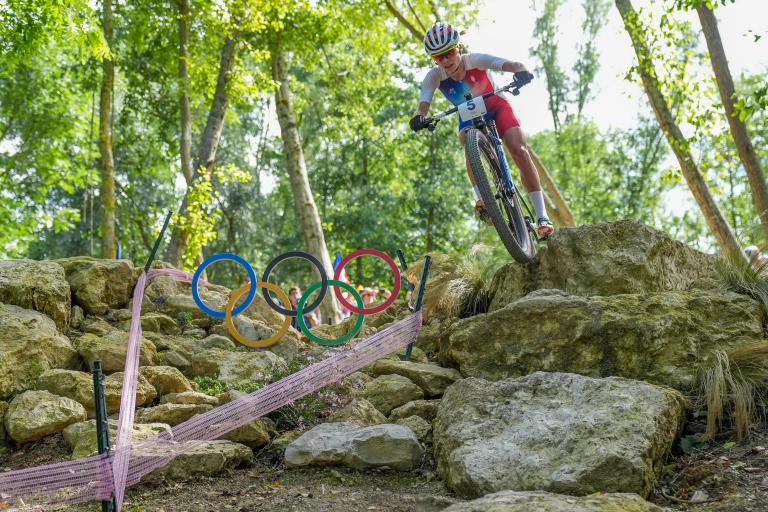
Coaches say French mountain biker Loane Lecomte is “fine” after losing consciousness following harrowing crash on rocks during Olympic cross-country race
In the women’s cross-country race in Elancourt yesterday, home hero Pauline Ferrand-Prévot bid a fitting farewell to the mountain bike scene before her eagerly anticipated return to the road with Visma-Lease a Bike, the 15-time world champion pulling off a storming solo ride to win her first ever Olympic gold medal in front of an ecstatic French crowd.
(Zac Williams/SWpix.com)
However, behind the French superstar’s blistering long-range move, thoughts turned to Ferrand-Prévot’s compatriot Loana Lecomte, who crashed heavily and lost consciousness on a rock garden section of the course.
Lecomte, who also entered yesterday’s race as one of the favourites for a medal, was riding in a chase group containing eventual silver and bronze medallists Haley Batten and Jenny Rissveds when she crashed while descending on the rocks, staying on the ground before being quickly treated by medical staff, who stretchered her off the course.
However, despite the apparent severity of the fall, the 24-year-old was pictured smiling after the race, albeit with bandages on her chin and elbow, as the French Cycling Federation confirmed that Lecomte was “fine”.
🇫🇷 Des nouvelles rassurantes pour Loana Lecomte ❤️
Tu reviendras plus forte championne.
📸 FFC pic.twitter.com/u6G3PeNdS7
— SPORTRICOLORE (@sportricolore) July 28, 2024
“She lost consciousness for a short while but now she is conscious, she is with the medical staff. She is fine,” the FCF told France 3.
Meanwhile, France’s mountain bike coach Yvan Clolus also told L’Equipe: “Loana has a facial trauma that will not be serious in the end, she will recover and come back stronger.
“We can imagine her pain. We saw her ready too today, in the first two laps. Loana is instinctive. She comes from alpine skiing. She is not afraid of commitment at all. She rides at 100 kph, she jumps.
“As she is young, we will be able to correct that. We will surround her and be there as we were with Pauline after Rio.”
29 July 2024, 10:11
The expert’s guide to fitting your tyres and tubes perfectly
Next time you’re wrestling with those pesky tyres, try out some of these hints and tips from Lukas Knoll – former bike shop mechanic and now account manager with TPU inner tube innovators, Tubolito – to help you install your next inner tube flawlessly with no faff.
Well, unless you’re me, that is…
> The expert’s guide to fitting your tyres and tubes perfectly — essential tips and advice from lightweight inner tube innovators Tubolito
After obtaining a PhD, lecturing, and hosting a history podcast at Queen’s University Belfast, Ryan joined road.cc in December 2021 and since then has kept the site’s readers and listeners informed and enthralled (well at least occasionally) on news, the live blog, and the road.cc Podcast. After boarding a wrong bus at the world championships and ruining a good pair of jeans at the cyclocross, he now serves as road.cc’s senior news writer. Before his foray into cycling journalism, he wallowed in the equally pitiless world of academia, where he wrote a book about Victorian politics and droned on about cycling and bikes to classes of bored students (while taking every chance he could get to talk about cycling in print or on the radio). He can be found riding his bike very slowly around the narrow, scenic country lanes of Co. Down.
Latest Comments
- Clem Fandango 12 min 49 sec ago
That might take out a few cows too, thus reducing the impact of the real scourge on public safety.
- chrisonabike 39 min 5 sec ago
Perhaps you're running them at lower pressures / with extra weight? I've found they feel sketchy at least when cornering and I've had a few offs...
- chrisonabike 45 min 21 sec ago
True ... but left to itself that notion tends to go the same way as instructing pedestrians, cyclists and SUV drivers to "share the road"!...
- mdavidford 1 hour 57 min ago
To be fair to them, it looks like a choice between that or a lot of sunken surfaces and ironworks further out.
- mdavidford 2 hours 4 min ago
...mostly among sports administrators, media, and cycling fans.
- Geoff H 2 hours 28 min ago
>THIS< is the primary reason for 99%+ for a camera!!!!!
- Pub bike 2 hours 53 min ago
At what point will politicians realise that no amount of effort can really protect vulnerable users on roads and that to keep people safe automatic...
- Paul J 2 hours 57 min ago
You need to "guess" the corresponding post code as well. A bit of internet sleuthing should give you options.
- slc 3 hours 16 min ago
Doubtless, which is why I avoid the eastern parts of Kingswood.
- Jogle 3 hours 24 min ago
False advertising, if you ask me. That post didn't give way when it was hit!
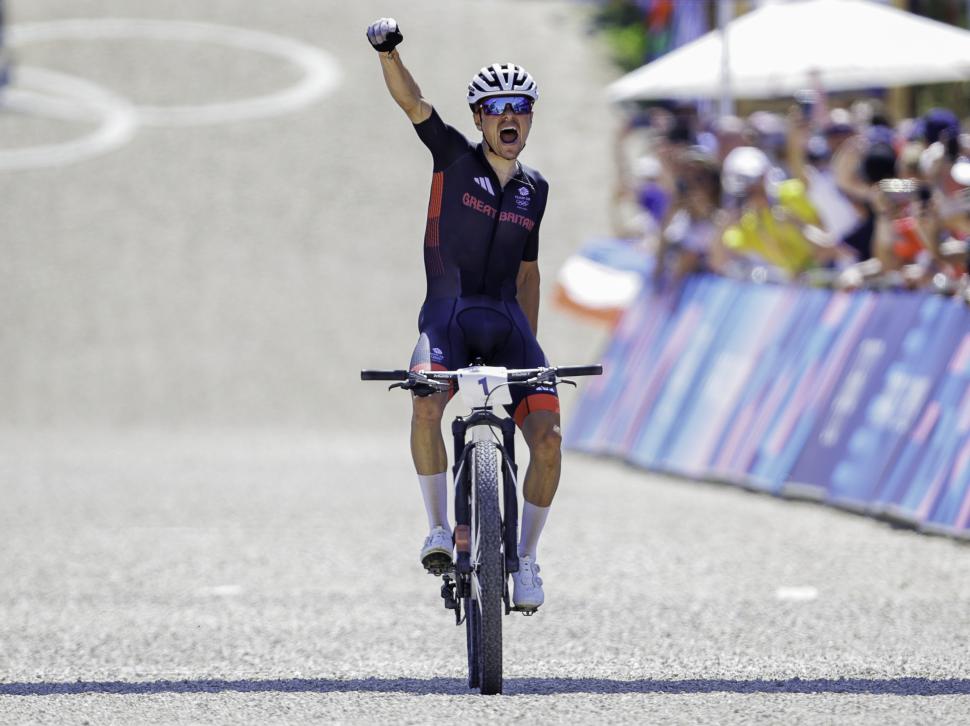
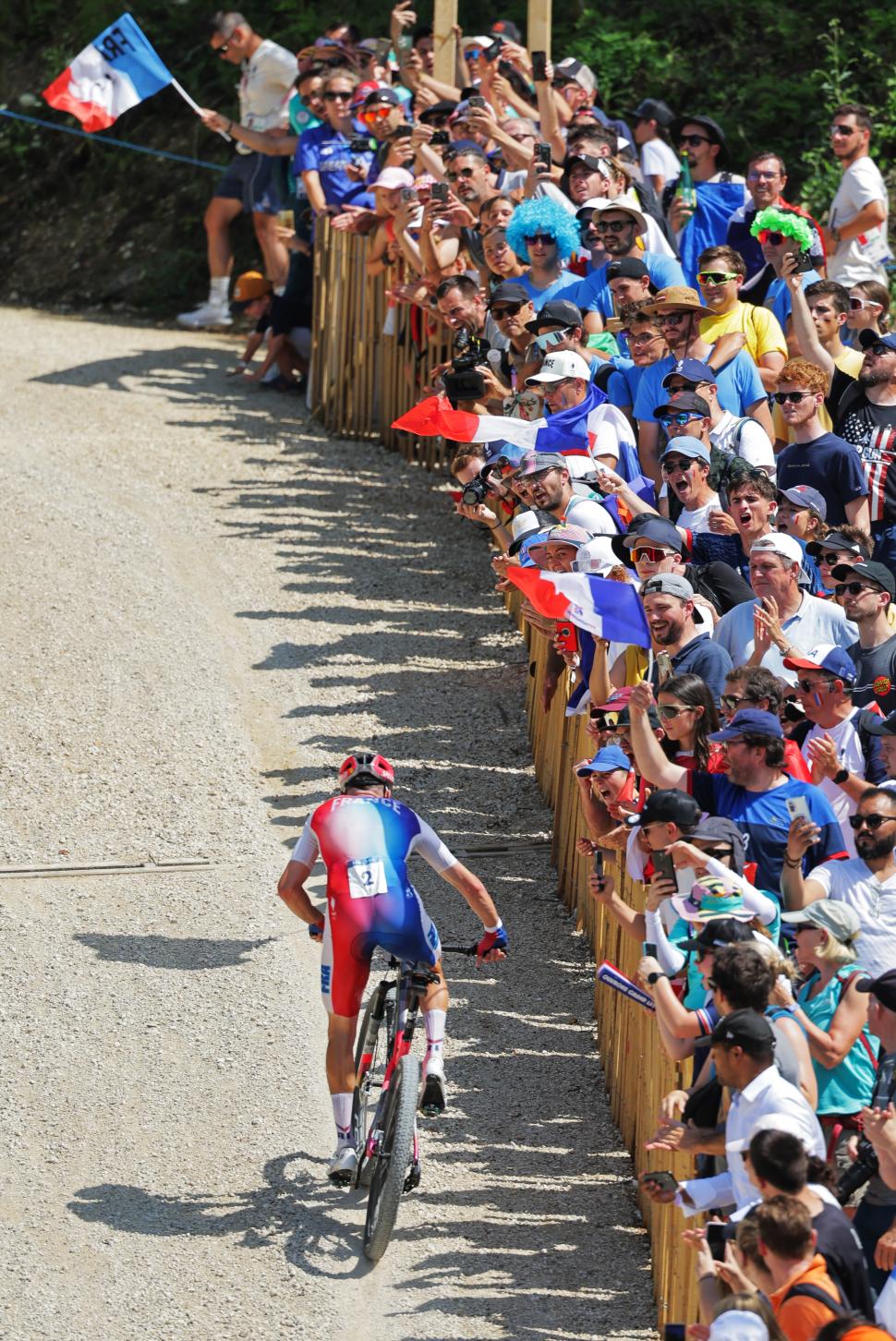
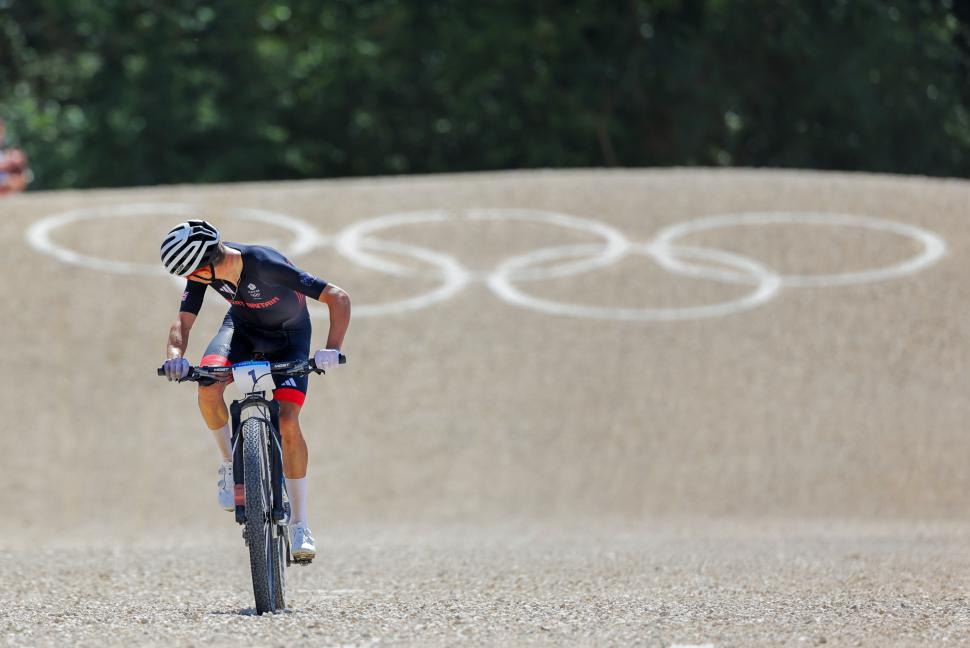
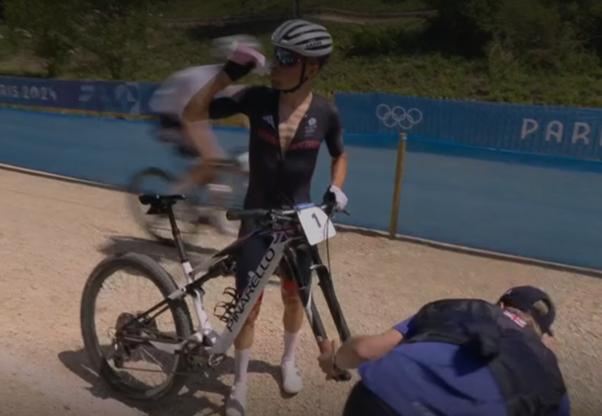
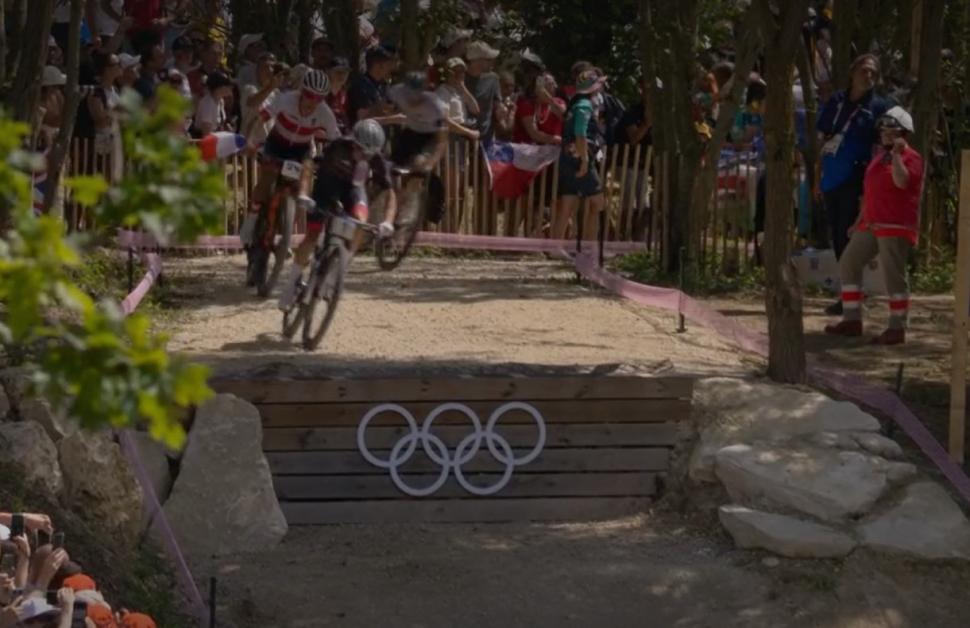
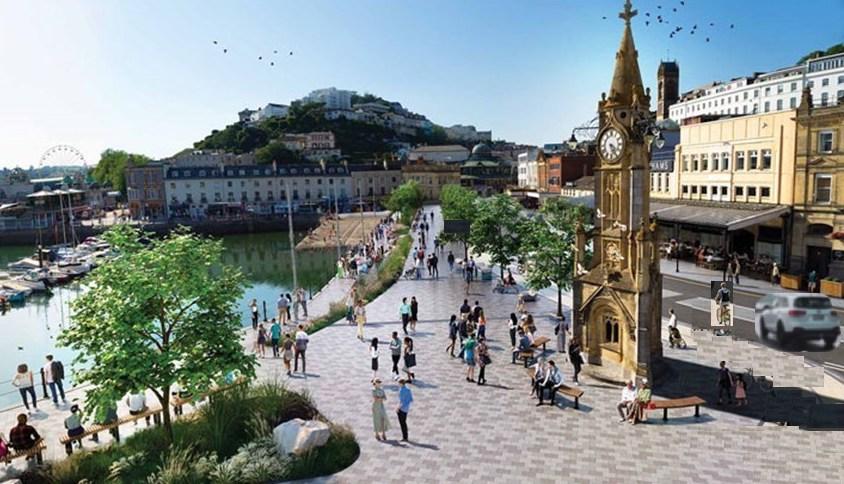

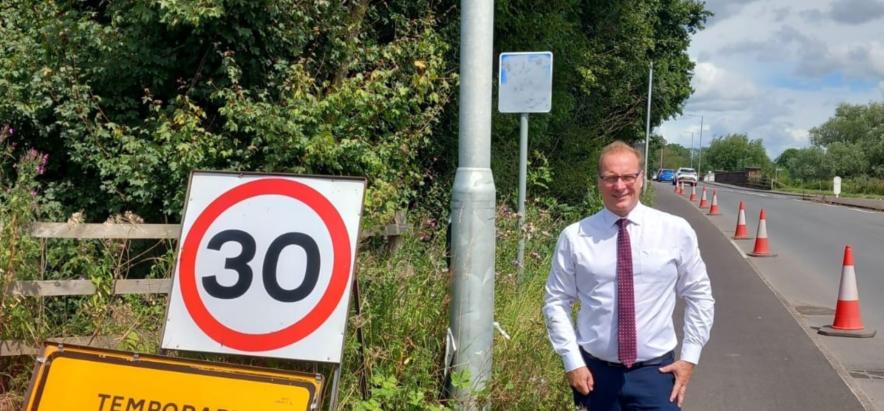
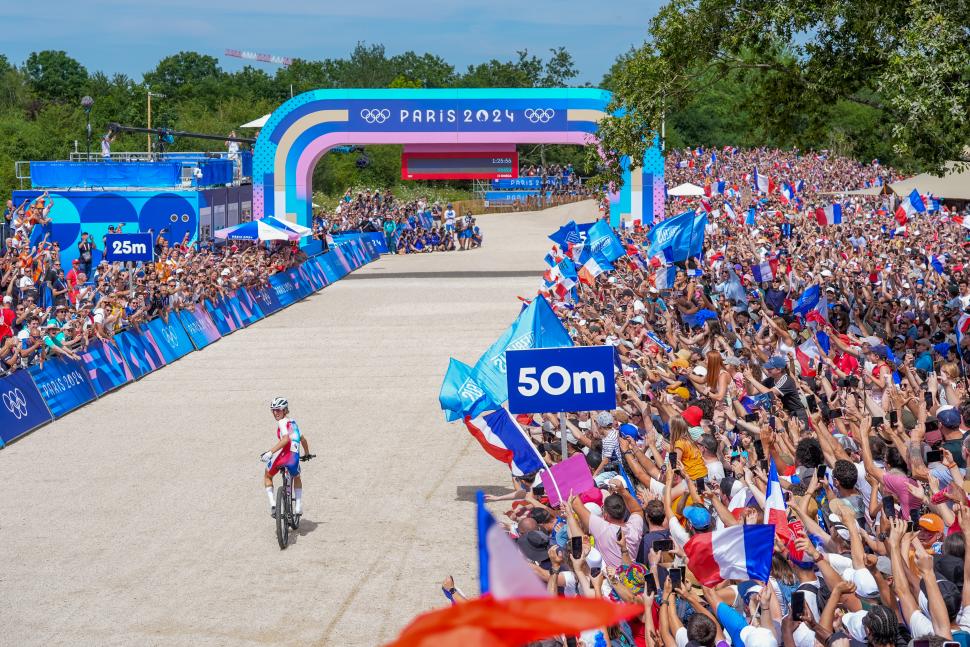
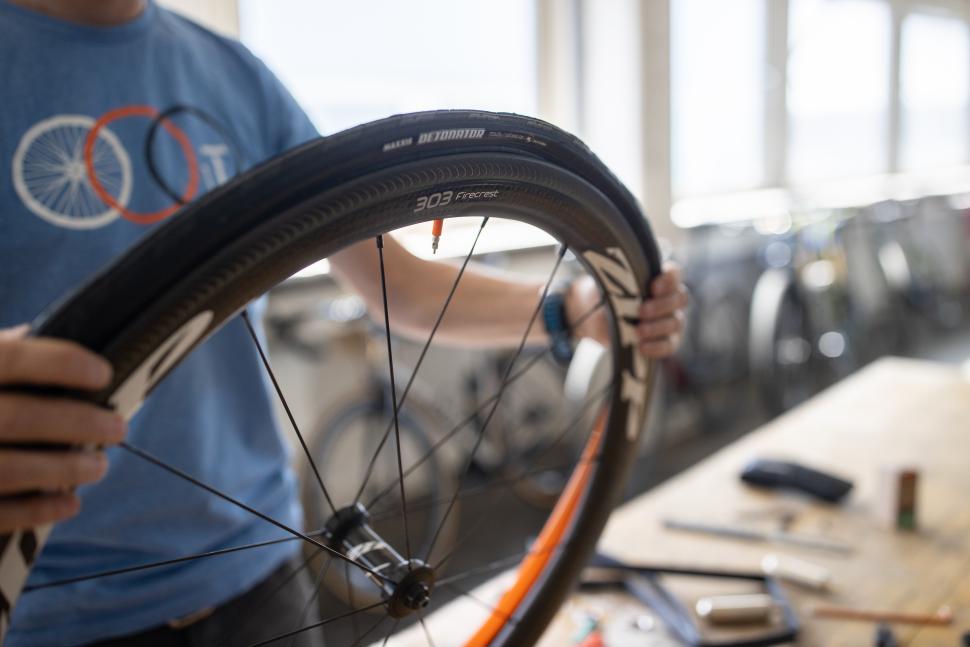
Add new comment
45 comments
I wasn't on here yesterday, so have just seen that clip of Koretzky's mistake before. The TV coverage was actually pretty poor - both from the host broadcaster (who almost missed Pidcock crossing the line as they showed replays and then other riders) and from the BBC - who switched channels with a break, during which Pidcock suffered his puncture.
Ths BBC have a very bad record of doing that. The run time of the XC races was known in advance and it's not as though the switching of channels was for what I'd call a 'protected service', the news, so there was really no excuse for failing to have a single broadcast covering the entire race when it was clearly going to be one of the events likely to get uninterrupted coverage.
I agree that the host coverage has been spotty too, and it's not even always been a case of watching a home nation competitor over the most relevant action, almost as though the director didn't know what it was important to show at times.
That was just ridiculous, scrabbling around to find the right channel when they switched, seemingly minutes of Hazel Irvine telling us what was going on and what was coming up, finally switched back to find Tom standing in the pits slurping a gel, a key moment in the race completely missed. The multiple split screen interruptions to tell us that we could be watching the horse people winning a medal were also infuriating, no disrespect to them but if that was my bag I would've been watching them already!
If you thought that was bad, their 'live, uninterrupted iPlayer coverage' of the Men's Triathlon just cut away in the last half a lap to show us some rowing instead!
Oh, and am I the only one who finds the BBC's Matt Payne's commentary style... well... painful to listen to? I've always found it really irritating the way he keeps eeeeeextending words, and says things like "coming down the ahrocks" or "the ahBritish rider...". What's with adding 'ah' to the beginning of words. He also says some things so fast that he ends up slurring words.
I don't know what it is about cycling commentators that so many of them have annoying attributes. Ned Boulting and David Millar are the only ones who never annoy me!
Horses for courses, I guess - Boulting and Millar are the only two commentators I find intensely annoying. Not sure what it is but give me CK anyday.
Ric McLaughlin is pretty decent on the mic for Eurosport's coverage of MTB disciplines, but he's no Rob Warner.
Chris Kamara? He'd miss Pidcock's puncture even without the BBC's poor schedule planning! 🤣
He was once told to say Ahhhh, and never stopped.
I'm prepared to give the French fans the benefit of the doubt for booing Pidcock. They'd have seen it on the big screen and, with the added influence of national bias, could be forgiven for thinking it was a dirty move. In reality, Tom was perfectly entitled to take the other route, that's the whole point of having them. Koretzky definitely rode into Pidcock, rather than vice versa, but it wasn't his fault any more than it was Pidcock's. Racing incident, as the say in motor racing.
Had Pidcock launched himself into the French man's wheel with his own, I'd very much be critical of his actions and expect a DQ. But that's not what happened. I suspect most of the booing spectators - at least those who have previous knowledge of the sport - would later accept, albeit begrudgingly, that it was a fair move.
What did disappoint me was the way Pidcock was ushered away from the finishing area without him appearing to speak to his fellow medalists, but I couldn't tell who initiated that.
As for the women's race, I was very happy to see Pauline Ferrand Prevot win the title at her final attempt. Hopefully Evie gets hers before too long.
And I'm glad to see Loana Lecomte on her feet because that was a scary crash to watch. Clearly out cold. Mind you 10/10 for the FCF's understating the seriousness of her injury. I hope their long-term assessment her condition is more cautious.
According to her instagram account, she said she had 'a little concussion' - and will be back for the Worlds in Andorra in a months time.
From what I've heard, a concussion is a concussion, there is no little concussion; Evie was out for 6-7 weeks with concussion....
Absolutely. I've had at least 3 concussion in my life, thankfully well spread apart, and the only difference is the recovery time regarding feeling normal. The effect remains the same regardless and should never be underestimated.
Why don't cyclists use the bike lanes ?
Reason 20240727: Filippo Ganna
I don't think that the tarmac surface of this particular bicycle path is slippier than the main paved surface with granite blocks. But even if the main road was tarmac, it wears much more due to heavy loads from cars and trucks, making it more slippery. I ride mostly on cycle paths and yet all my crashes due to slippery tarmac wereon roads designed for motor traffic, except one case at a paved surface with granite blocks (the worst possible option for bicycles!)
A bigger problem I have faced with cycle paths are that they often have a poorly compacted subbase even for the light weights they are designed they can easily be deformed, giving cyclists a bumpy ride, that can be also dangerous besides just uncomortable.
Much hand-wringing over the dangers of floating bus stops this morning on BBC Breakfast News, wrapped up with an apology for the 'distressing scenes'!
Some footage of a lady with a guide dog, which actually looks like she's pushing the guide dog into the cycle lane. Other footage of near-misses and a collision filmed by 'anti-cycle lane campaigners', where pedestrians just step out without looking. On second look, almost seem set-up (probably not though, but did make me wonder).
17:21 in...
https://www.bbc.co.uk/iplayer/episode/m0021lrh/breakfast-29072024
RNIB appear to have adopted a position that bus stop bypasses are just bad. ("Evidence tells us that the current design of bus stop bypasses is dangerous for blind and partially sighted people".) See eg. here. Not sure exactly what evidence - the studies I'm aware of were at least cautiously positive on pedestrian-cyclist interactions at these in the UK (eg. see TfL 2024 review *). The media made the latter sound bad!
Possibly under the influence of the tiny cycle-phobic "National Federation of the Blind of the UK" who have somehow managed to get a lot of noise and support against these.
A variety of designs appear to be uncontroversial in other countries. Of course it may be that - like us with cars - the majority have just steamrollered the interests of others. OTOH I *think* some news might have leaked out if all was as dire as painted by campaigners in the UK.
Of course the current UK-standard "no cycle infra - cyclists actually have to deal with buses pulling in on them" certainly isn't safe.
Given the environments we now expect those with visual impairments or indeed other disabilities to deal with, and the general "don't care" (even where there's now legal duty eg. accessibility) ... perhaps it's not surprising that people don't think changes will be positive for them.
*"... when a pedestrian was at the zebra crossing, it was rare this coincided with a cyclist nearby on the track. Nevertheless, when there was an interaction, a significant proportion of cyclists did not yield to pedestrians at the zebra crossings as they should. Although not statistically significant, these observations align with concerns raised about people cycling not giving way at the bus stop bypass zebra crossings"
I suspect that's more how it works in NL and is down to "expectations". In the UK pedestrians may expect cyclists to stop completely, like cars (hmm...). In NL they don't, but both parties know it's easy for either the cyclist to slow slightly to give space or the pedestrian to wait a couple of seconds while the cyclist passes.
I was surprised that the person in the article didn't appear to notice the raised strips on either side of the cycle lane as they veered in and out of it. But without being told I don't see how would a blind person know where the cycle lane was on the footway. Maybe Grimsby-style announcements are needed?
Main issue I think is our approach to cycle infra (I suspect "non-motor vehicle infra" in general). It's "why not try making some yourself - if you like?" *
Result - very rare, patchy, inconsistent stuff (even within the same "scheme").
How would anybody know?
* Interestingly I discover that actually in NL in one sense the same system applies! Apparently there aren't any direct rules about what should be built. However they have a) a long history of this b) "what works" is well understood and all things road safety are nationally codified, if not mandated c) it's generally uncontroversial d) there are other responsibilities on local governments / highway authorities which effectively mean that if you can't back up what you've done, it's you in court.
Some good points. I do think this is a cultural issue, as one of the comments they read out on the BBC article stated: people need to accept change and not just cross the cycle lane without looking!
The lady who was surprised by an e-scooter rider whizzing past the wrong way on the pavement seemed to blame that on the bike lane. I'm quite sure that e-scooter rider would have done exactly the same regardless of whether there was a bike lane or not!
Well obviously some people can't look...
... but those people world still have to deal with eg. side roads where there is not even an informal crossing.
Ultimately I agree that it is cultural / about social norms. The down side is that the "learning" will involve some "trial and error" - no matter how many awareness campaigns we run. Just like any changes we've made to our roads / road laws. Not consequence free for everyone. I think where this can help us end up (as a part of genuine modal shift to mass cycling) is better however.
I think data from elsewhere will prove the best of these designs ** overall sufficiently safe. I'd say the *concern* of those with visual impairments is reasonable - since:
- this is a new / extra thing to deal with.
- this infra is unfamiliar * to both UK pedestrians and UK cyclists (Witness lots of pedestrians waiting in the cycle path). And if not most of the *cyclists* will also be "new" if the new facilities do what they're supposed to.
- "silent and deadly" cyclists compared to noisier cars - also can be disguised by the noise of an approaching bus.
OTOH cycle paths being narrower than roads and expected speeds being slower it should be much easier and safer to cross a cycle path.
* Actually - not quite novel - as the Ranty Highwayman points out these actually have existed for a long time in the UK in a form where the "bypass" is actually a "service road"! https://therantyhighwayman.blogspot.com/2021/10/floating-bus-stops.html
** eg.c the "floating" kind, not the "Copenhagen" type https://www.cycling-embassy.org.uk/dictionary/copenhagen-style-bus-stop-...
Just the latest in the never ending BBC attacks on cycling.
Chapeau Mr Pidcock. Pretty much my entire office was in the kitchen watching that.
One of the most exciting races I've seen in any discipline, magnificent!
That was a battle royale. What a move through the trees.
To come back after that puncture, not exactly F1 speed pit stop tyre change either!
So much for marginal gains, never understood why they don't practice or plan for stuff like that, still, it didn't matter in the end.
I read elsewhere that he got booed because the crowd thought he'd nudged Koretzky, but that other footage showed that Koretzky actually bounced off the marker logs along the side of the route and that was why Pidcock could get past him.
There is no doubt that Pidcock was ahead and way over to the left by the tape and Koretzky went into him- those who boo-ed were very unsporting. These were two great athletes giving everthing they had for the win, and the winner deserved the Gold! I would have said the same thing had the roles been reversed. Fantastic bike handling by Pidcock.
Reply to wtjs:
Pidcock was speeding ruthlessly into the junction point where the two tracks came together, while he was, apparently, not noticed by the leading Koretzky. Pidcock was clearly accepting the risk of a bad crash here. His action was within the rules, as he was ahead at the junction point, but the entire thing was very high risk and not really pretty. (It seems a bit like overtaking a lorry on the left, leading up to a junction... Maybe.)
It's a pity the race ended like this - after Pidcock's amazing recovery from a puncture (having been super-cool in waiting for the mechanics to finally show up!) and clearly deserving to win this.
Sounds like a bit of post hoc rationalisation on someone's part - there were already people booing much earlier, when Pidcock first caught back up to Koretzky following the mechanical - I don't think there was much more to it than not liking the home rider losing out.
Latest green-washing from an oil company, this time Esso giving away e-bikes
https://www.esso.co.uk/en-gb/onelessdrive?fbclid=IwY2xjawEUaexleHRuA2Flb...
I have asked them what make and model, but no response, and I did say that if it is the one pictured and I win, to throw it in the nearest skip to save me the trouble. Bizarre that they used the shadow of a tennis player.
Pages